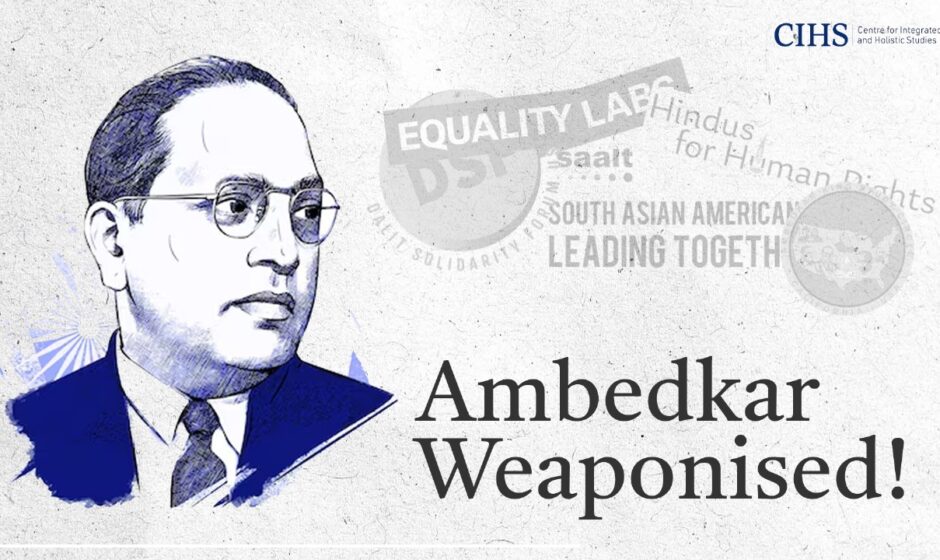Neo-Ambedkarite groups in US, Europe invoke him to promote the very causes he opposed: religious dogma, separatism and ideological violence. This isn’t social justice; it’s soft warfare against Bharatiya unity in the guise of activism.
Dr. Shailendra Kumar Pathak
Dr. B.R. Ambedkar remains one of Bharat’s most influential and tallest intellectuals, a fierce advocate for rights of the downtrodden and architect of Bharat’s Constitution. His political, religious and philosophical views were grounded in rationalism, human dignity, national integrity, and democratic values.

In recent times, however, self-proclaimed Ambedkarite groups operating from UK and US have fundamentally deviated from his original principles. These organizations that actively engage with global radical Islamist networks and evangelical Christian lobbies promote agendas that are anti-Hindu, anti-Bharat and in many cases subversive.
A detailed examination of Dr Ambedkar’s original works including “Pakistan or the Partition of India,” “Buddha or Karl Marx,” the “Constituent Assembly Debates” and speeches such as “Annihilation of Caste,” reveals a clear misappropriation of his legacy by the present day outfits.
To begin with, Ambedkar was never a critic of Hinduness. His sharp critique was specifically aimed at caste system and its dehumanizing effects but he never spared Islam, Christianity, or communism from scrutiny either.
In “Pakistan or the Partition of India,” Ambedkar expressed grave concern about Islamic worldview. He argued that Islam fostered a brotherhood limited only to Muslims and viewed others with contempt.
He wrote, “The brotherhood of Islam is not the universal brotherhood of man. It is brotherhood of Muslims for Muslims only.” Furthermore, he warned that Islamic law, which prioritizes religious allegiance over national loyalty, posed a significant challenge to Bharatiya nationalism.
As per Ambedkar, Islam’s insistence on Sharia supremacy over civil laws, integration into a secular and democratic Bharat was difficult. He highlighted historical destruction of Hindu temples by Islamic rulers as proof of Islam’s violent legacy in Bharat.
Ambedkar’s views on Christianity were equally candid. He noted that Christianity, while preaching equality, had historically supported slavery and racial segregation. In his view, both Islam and Christianity were unsuitable for addressing Bharat’s social issues.
Their ‘universalist’ rhetoric notwithstanding, both religions, according to Ambedkar, were more interested in expanding their spheres of influence than genuinely uplifting the oppressed. This led to him embracing Buddhism and not these two faiths.
Buddhism, on the other hand, he considered an indigenous, ethical, and rational path grounded in compassion and equality. In his essay “Buddha or Karl Marx,” Ambedkar contrasts moral, non-violent methods of Buddha with violent revolutionary approach of Marx. He praises Buddha for seeking to transform through inner change, rather than coercion or armed struggle.
Ambedkar was also a consistent critic of communism. He saw its violent methods and contempt for individual liberty as deeply flawed. He argued that communism’s promise of a withering state and classless society masked the reality of permanent dictatorship and suppression of dissent.
In his writings, he asked pointedly whether any economic end justified mass killing and loss of human values seen in communist regimes. He blamed communist labour leaders for exploiting workers to nourish their political gains and general failure of Bharat’s labour unions.
Ambedkar’s political positions were deeply nationalist. He emphasized Bharat’s territorial integrity and democratic unity above sectarian or ideological interests. He criticized the Indian National Congress not because he was against the idea of Bharatiya self-rule but because Congress exploited caste and communal identities for electoral gain.
He accused Congress of selecting candidates from dominant castes, thereby marginalizing truly oppressed communities. He flagged the issue with Congress’s approach to Hindu-Muslim unity, accusing them of appeasement rather than principled negotiation. He found the Hindu Mahasabha more forthright in its communal positions than the Congress, which he believed played double games.
Regarding Gandhi, Ambedkar was blunt. He criticized Gandhi’s role at the Round Table Conference, calling him petty-minded and poorly equipped to deal with complexities of communal negotiations. He accused Gandhi of widening social rifts rather than healing them.
While he acknowledged Gandhi’s early concern for untouchability, he ultimately found Congress efforts tokenistic and ineffective. Funds meant for Dalit upliftment, according to Ambedkar, were misused or wasted with little real impact on the ground.
Against this backdrop of rational critique and democratic commitment, neo-Ambedkarite movements emerging in West appear not only disconnected from his philosophy but actively working against it.
In United States, outfits such as Equality Labs, Ambedkar International Center (AIC), Ambedkar King Study Circle (AKSC), South Asian Americans Leading Together (SAALT) and Dalit Solidarity Forum have established close working ties with global Islamist fronts and Christian evangelical networks.
Their participation in “Dismantling Global Hindutva” campaign a platform notorious for anti-Hindu, anti-Bharat propaganda—exposes their alignment with ideological forces that Ambedkar explicitly rejected.
Similarly, in United Kingdom, organizations like Caste Watch UK, Anti-Caste Discrimination Alliance (ACDA), Voice of Dalit International (VODI) and Europe-based International Dalit Solidarity Network (IDSN) have increasingly become vehicles for lobbying against Bharat on international forums.
Rather than focusing on constructive social change or building solidarity through inclusive reforms, many of these groups engage in litigation-driven activism and diplomatic lobbying, often backed by church-linked NGOs and hardline Islamist organizations. Their rhetoric disproportionately targets Hindu identity and Bharatiya sovereignty, mirroring talking points of those who have long sought to destabilize Bharat’s national unity.
Their agenda is not centered on social upliftment through moral and constitutional reform as Ambedkar envisioned but on creating a permanent atmosphere of victimhood and communal division. These groups exploit caste-based grievances to create unrest within Hindu society and push vulnerable sections toward religious conversion and even radicalization. They also romanticize violent ideologies like Naxalism which Ambedkar would have unequivocally opposed given his commitment to constitutional democracy.
Ambedkar’s shift from forming Scheduled Castes Federation to proposing Republican Party of India reflects his political evolution he moved from a caste-specific platform to a more inclusive political identity aimed at uniting all marginalized groups. His emphasis was always on national unity, moral reform and social harmony.
In fact, there are strong philosophical parallels between his vision and RSS concept of “Samrasta” a doctrine of social harmony grounded in Advaita (non-duality). Both Ambedkar and proponents of Samrasta believe that equality cannot be enforced through law alone but must be cultivated as a state of mind and social ethics.
Unlike these contemporary neo Ambedkarites, Ambedkar chose a spiritual path that was indigenous, non-violent, and inclusive. His Buddhism was not just rejection of caste Hinduism but that of Abrahamic dogma and Marxist authoritarianism.
He was, fundamentally, a nationalist and a democrat. He believed in Bharat, not as a loose federation of grievance based identities but as a unified, secular republic where dignity for all was the constitutional promise.
Those operating under the banner of Ambedkarite politics in UK and US have strayed far from his foundational principles. Their anti-Hindu, anti-national and pro-violent posturing bears little resemblance to Ambedkar’s moral clarity, constitutionalism and reformist zeal.
Dr Ambedkar critiqued all systems religious or political that undermined human dignity and national cohesion. He cannot be reduced to a tool for sectarian politics and any movement that does so stands in direct contradiction to the very legacy it claims to uphold.
These Western outfits have weaponized Ambedkar’s name to undermine the very nation he helped to found and reform. Their vision is not one of empowerment but of division, not of justice but of ideological colonization.
(Author is a Delhi based researcher, Political Analyst & formerly an Assistant Professor of Political Science)



